Decolonising Academic Writing and Diversifying Publication Languages: Positions and Possibilities
The international academic publishing system is increasingly dominated by Anglo-American publishers, procedures, and writing requirements, and by the exclusive use of English. In contrast, in the Global South, for example in the Arab world, there are calls for the decolonisation of academic writing, the promotion of regional publishing houses, and the (re)recognition of Arabic as an academic language. Moreover, in many countries, such as in the Maghreb, scholars have grown up in a French-based academic system to which they are accustomed, but from which they are also trying to escape. But even in the Western world, the traditional “big” languages of knowledge such as German, French, and Spanish are increasingly being replaced, less and less perceived internationally, and less recognised, even in their own countries. In this context, this public MECAM “Winter Talk” will address issues such as postcolonial writing, Anglicisation and Americanisation vs. diversity of academic languages, multilingual publishing, linguistic (but also conceptual, ….) translation problems, different linguistic logics and possibilities of expression in the respective languages, etc.
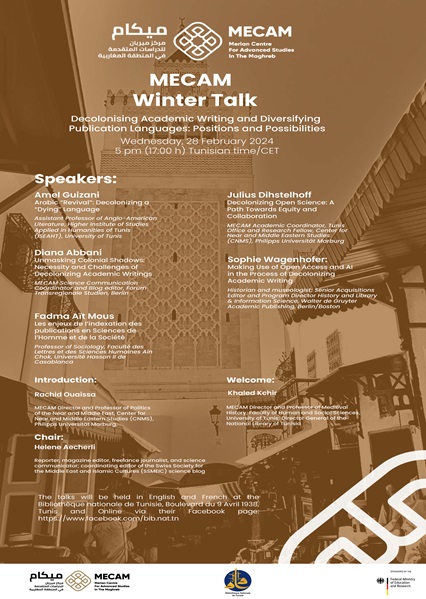
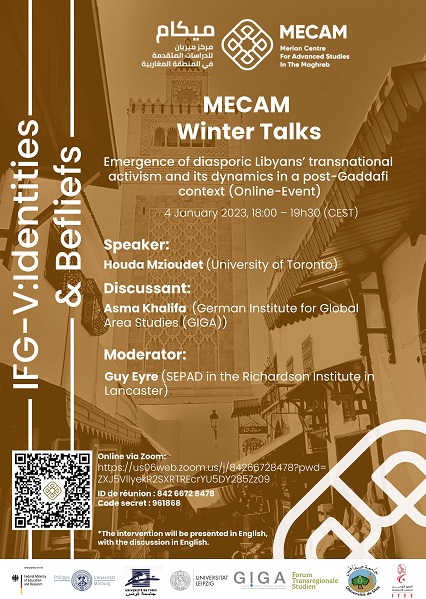
Emergence of diasporic Libyans’ transnational activism and its dynamics in a post-Gaddafi context
(Online-Event)
This Winter Talk with Houda Mzioudet, discussed by Asma Khalifa and moderated by Guy Eyre (IFG V) explores the Libyan diaspora and their active mobilization in effecting social and political impact with regards the conflict, as well as the formation of the Libyan exiled community after the fall of the regime of Gaddafi and its role in building a network of active intellectuals, politicians and civil society activists in the country’s reconstruction. It maps out the main Libyan diaspora organizations, their nature, and the type of work they do. It contextualizes the diasporic mobilization of exiled Libyans during the 2011 Libyan uprising, and their role in its shaping by highlighting shifting patterns of the diaspora since 2011. Through a comparative perspective, this talk seeks to capitalize on the changes in the scope and nature of the Libyan diasporic mobilization in the peace and reconciliation efforts.
The intervention will be presented in English, with the discussion in English.
“ Peut-on “raciser” le terrain tunisien ? Les multiples identités noires et leur relative complexité du point de vue historique et anthropologique ”
[Can the Tunisian field be racialized ? Multiple black identities and their relative complexity from an historical and anthropological point of view]
While the “black Tunisian” population today is made up of both descendants of slaves and immigrants, the current social discourse and the discriminatory images conveyed systematically accuse these Tunisians of a slave ancestry, not only do not make such distinctions, but have ended up, because of this racialization since the end of the 19th century, giving rise to a devaluing image for these populations in a global way.
At the same time, more and more new sub-Saharan immigrants are entering Tunisia and settling there more or less permanently, in situations of legal, economic and status insecurity that are quite visible and significant.
Faced with this multitude of identities, backgrounds and origins that characterize the “black” population in Tunisia, and in view of the way in which, since the 19th century, administrative and political authorities have managed and considered the various existing black social categories and the consequences of such considerations, it seems important today to question the relevance of the use of racializing concepts by social scientists, even though it seems inevitable to resort to conceptual tools that allow for the apprehension of these identities, which are often considered as “separate”.
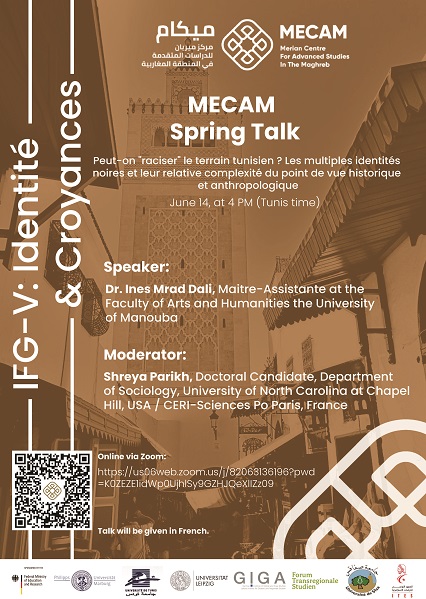
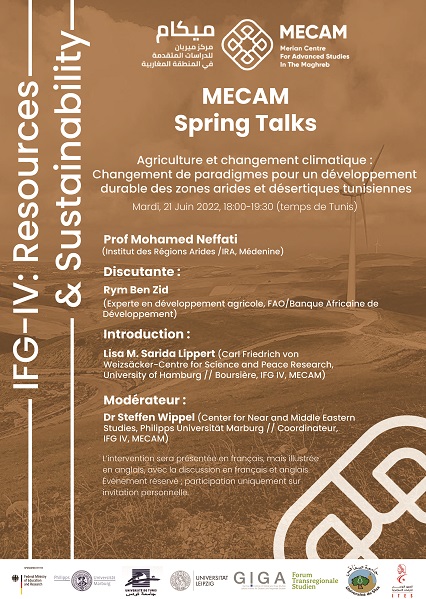
Mohamed Neffati : Agriculture et changement climatique : Changement de paradigmes pour un développement durable des zones arides et désertiques tunisiennes
[Agriculture and Climate Change: Paradigm Shift for Sustainable Development in Tunisian Arid and Desert Areas]
Tuesday, 21 June 2022, 18:00-19:30 (Tunis time) // 19:00-20:30 (CEST)
The agricultural sector in Tunisia occupies an advanced position in the national economy and plays an important role in social and regional development. In addition to the profound socioeconomic changes that have visibly impacted the agricultural sector, the greatest challenges facing this sector are water shortages, recurrent droughts, soil degradation, loss of local genetic resources and the environmental crisis resulting from climate change.
In such a context, the conservation of local agricultural genetic diversity, the adoption of good agricultural practices and the return to good dietary habits constitute the basic foundations of a healthy and resilient agriculture well integrated in the triad of “clean agriculture – quality food – good health for all”.
Indeed, agriculture must be perceived as being in line with nature. To this end, we need to change the paradigms towards a positive relationship between humans, the environment, ecology and nature. The recommended transformation can be achieved through diversification, controlled intensification and the conversion of production systems to organic or ecological systems with high added value. In short, it is a question of adopting agroecological techniques and promoting local products.
The talk will be held in French with a presentation in English and the discussion in English and French. Private event; on-site participation by personal invitation only.//It will take place at the library Al Khaldounia, 67, Souk Al Attarine in the Medina of Tunis.
Wissem Ajili : Les agences de notation extra-financière : Un acteur incontournable de la finance durable et de l’investissement socialement responsable ?
Extra-financial Rating Agencies: Key Players in Sustainable Finance and Socially Responsible Investment?]
Wednesday, 15 June 2022, 16:00-17:30 (Tunis time) // 17:00-18:30 (CEST)
In the last two decades, non-financial rating agencies have become a major player in sustainable finance, particularly in developed countries. In a framework of asymmetric information, and under the hypothesis of limited rationality on the part of economic agents, extra-financial rating agencies constitute an indispensable incentive mechanism. Thus, stakeholders, such as financial institutions, investors, asset managers, companies, shareholders, and managers, are encouraged to disclose private and socially relevant information for the identification of sustainable financial actors and products and to promote socially responsible investment.
In developing countries such as Tunisia, extra-financial rating activity remains marginal or even non-existent. Extra-financial rating could constitute leverage for sustainable finance for both private and public actors and an opportunity to position themselves in a segment promoting the market of extra-financial data production.
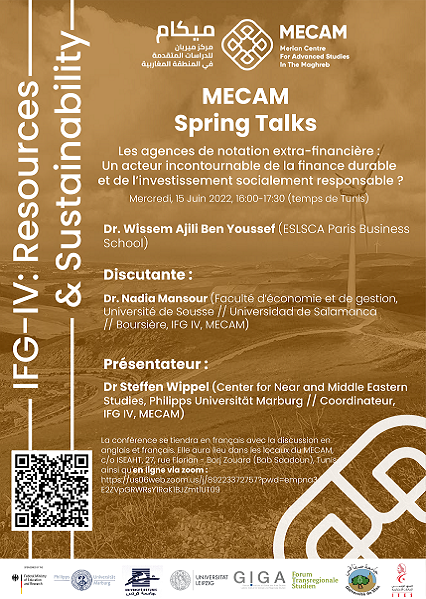
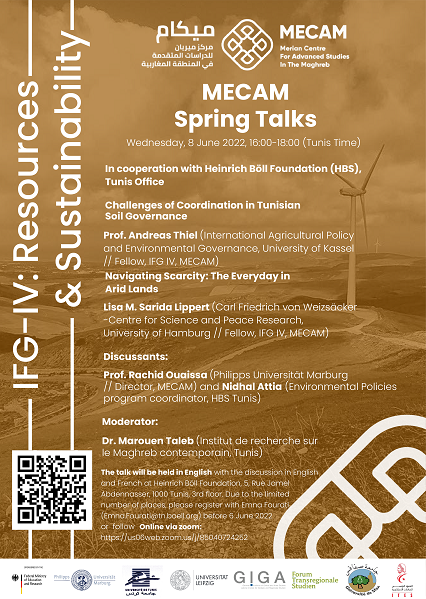
Andreas Thiel: Challenges of Coordination in Tunisian Soil Governance
Wednesday, 8 June 2022, 16:00-18:00 (Tunis Time) // 17:00-19:00 (CEST)
Rural areas in Tunisia face multiple social and ecological challenges. Soil degradation compromises agricultural development in the medium to long-term but needs to be seen in the broader context of climate change, social and demographic change but also political and administrative challenges of rural areas and even national contestation of the state. Against this background Andreas Thiel’s talk reports on a recent project on governance of soil protection in rainfed agriculture in arid regions of Tunisia that extensively gathered data at the local, regional and national levels of governance.
Starting from perceptions of farmers it reconstructs what are the most important vertical and horizontal coordination failures in relation to soil protection. Findings resonate with broader observations about the status of agricultural and environmental governance in Tunisia being characterized by lack of orientation, coordination and implementation of public policies, lack of funds and integrative vision for farming and rural areas in Tunisia. What political and governance responses may be adequate in times of uncertainty and great budgetary constraints may be a discussion which these materials lead to and which is of broader relevance beyond field soil policy. Degradation of soils compromises perspectives for rural populations which posits challenges for the Tunisian state at large.
This event takes place in cooperation with the Heinrich Böll Foundation (HBS), Tunis office. The talks will be held in English with discussion in English and French at the HBS conference room, 5, Rue Jamel Abdennasser, 1000 Tunis, 3rd floor. Due to the limited number of places, please register in advance with Emna Fourati (Emna.Fourati@tn.boell.org) before 6 June 2022, or follow Online via zoom: https://us06web.zoom.us/j/85040724252 or on HBS’ Facebook page.
The talks will be introduced by Fabian Heppe (Alternative Economy & Migration program coordinator, HBS, Tunis) and Dr. Steffen Wippel (Center for Near and Middle Eastern Studies, Philipps Universität Marburg // Coordinator, IFG IV, MECAM) and commented by Prof. Rachid Ouaissa (Middle East Politics, Centre for Near and Middle East Studies, Philipps Universität Marburg // Director, MECAM) and Nidhal Attia (Sustainable Development & Environmental Policies program coordinator, HBS, Tunis). Dr. Marouen Taleb (Institut de recherche sur le Maghreb contemporain, Tunis // ERC-TARICA Changements politiques et socio-institutionnelles en Afrique du Nord) will moderate the event.
Lisa M. Sarida Lippert: Navigating Scarcity: The Everyday in Arid Lands
Wednesday, 8 June 2022, 16:00-18:00 (Tunis Time) // 17:00-19:00 (CEST)
Lisa Lippert starts from the assumption that global warming and desertification severely challenge the livelihoods of rural populations. However, scarcity of natural resources and colliding forms of use do not necessarily lead to violent conflict, they also contain an opportunity for environmental cooperation, community empowerment and conflict prevention. Recent research diagnosed a sampling bias concerning case study identification in the literature on climate change and conflict, leading to the neglect of the option of peaceful outcomes. In order to understand the dynamics present in a climate change – conflict setting, scholars are encouraged to increasingly look into peaceful, non-violent settings.
How do people actually navigate through everyday challenges related to natural resources and which societal roles come into play here? How do they adapt to land degradation and ecological deprivation on a daily basis and which consequences might this entail for (local) peace and conflict prevention? Answering these questions is of great relevance not only for research on climate change and rural communities, but also for future development assistance and adaptation initiatives. Focusing on a case study in the region south of the Bouhedma National Park, Lisa’s talk presents first insights from field research investigating smallholder farmers’ everyday practices related to water and land.
This event takes place in cooperation with the Heinrich Böll Foundation (HBS), Tunis office. The talks will be held in English with discussion in English and French at the HBS conference room, 5, Rue Jamel Abdennasser, 1000 Tunis, 3rd floor. Due to the limited number of places, please register in advance with Emna Fourati (Emna.Fourati@tn.boell.org) before 6 June 2022, or follow Online via zoom: https://us06web.zoom.us/j/85040724252 or on HBS’ Facebook page.
The talks will be introduced by Fabian Heppe (Alternative Economy & Migration program coordinator, HBS, Tunis) and Dr. Steffen Wippel (Center for Near and Middle Eastern Studies, Philipps Universität Marburg // Coordinator, IFG IV, MECAM) and commented by Prof. Rachid Ouaissa (Middle East Politics, Centre for Near and Middle East Studies, Philipps Universität Marburg // Director, MECAM) and Nidhal Attia (Sustainable Development & Environmental Policies program coordinator, HBS, Tunis). Dr. Marouen Taleb (Institut de recherche sur le Maghreb contemporain, Tunis // ERC-TARICA Changements politiques et socio-institutionnelles en Afrique du Nord) will moderate the event.

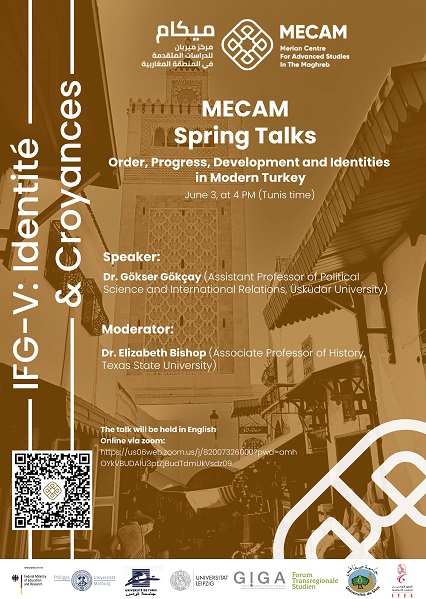
Order, Progress, Development and Identities in Modern Turkey
Friday, 3 June 2022, 16:00 – 17:30 (CET / Tunis Time)
The last two centuries of Modern Turkey can be described as a history of a series of identity crises. Since the Ottoman Empire, key members of the Elite have experienced a constant need for new orders with response to these crises. The first of these crises coincided with the Age of Revolutions in Europe and centered around the military and central state institutions in the late eighteenth century. However, later it was found out that the crisis was not limited to the institutions structure and the way in which they were governed. The identification of the Ottoman subjects became a central concern, especially with the Greek and Egyptian crises. Despite the existing millet system, a new identity had to be conjured. During the Tanzimat period, which literally meant Re-ordering, the Ottoman identity became a highly contested issue among the Muslim, as well as non-Muslim subjects of the Ottoman Empire. The crisis has deepened with the emergence of Turkish nationalism as a counter-movement to nascent nationalisms in the Ottoman Empire in the image of a “progressive” movement. The Union and Progress committee self-described itself as the driving force to resolve the crisis in the Ottoman State and treated its subjects as passive receivers of its policies. In this talk, I aim to underline continuities and ruptures within these operating words of identity, order and progress, not just during the late Ottoman era, but also within the first century of the Republic. The existing fault lines in contemporary Turkey could be traced back to these crises and how the former solutions to them are resurface over and over again throught the Twentieth Century in Turkey.
The conference will be held at the MECAM premises, c/o ISEAHT, 27, rue Florian – Borj Zouara (Bab Saadoun), Tunis, as well as Online via zoom.
Nawel Saadaoui, parcours d’une militante
Nawal El Saadawi was born in 1931 in Kafr Tahla, a village in the Lower Egypt Delta north of Cairo. She was the second of nine children. Her family tried to marry her off at the age of 10 but she resisted. In 1955, she obtained a medical degree. Nawal El Saadawi was one of the first Arab feminists to break taboos about gender relations and women’s sexuality and to denounce the various forms of repression and dependence that the patriarchal and capitalist order imposes on them. Her works have led to her being prosecuted and forced into exile on several occasions. Feminist, writer and doctor, Nawal El Saadawi shares her own story. Her struggles for human rights, for women and the working classes have left their mark on the global feminist movement. She died on March 21, 2021, at the age of 89.
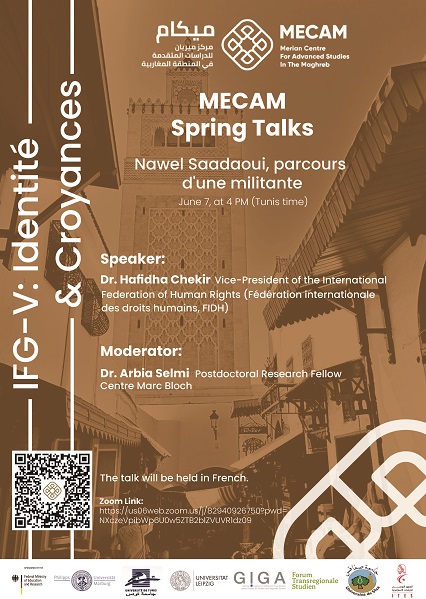
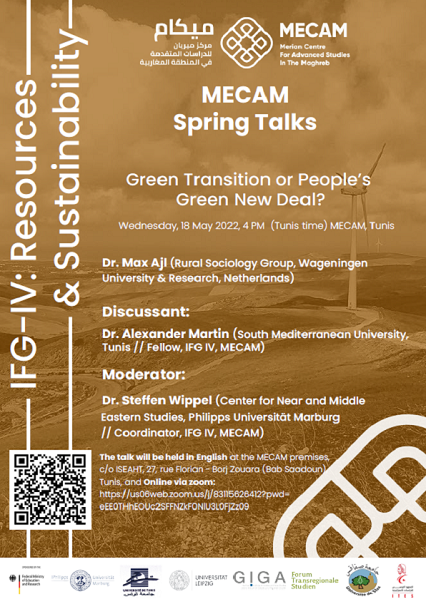
Max Ajl: Green Transition or People’s Green New Deal?
Conventional discussions of green transition essentially rest on technical and mild institutional transformation – an introjection of technology in order to transform a CO2 intensive social system. Accordingly, although it is a commonplace to call for “sustainable development,” these proposals accord a prominent role to corporations, elide South-North power dynamics, avoid distributional issues, suppress discussion of class, and accept the role of capitalism in the green transition. This presentation critiques some of the prevailing “Green Transition” proposals, and highlights North-South and class-centered problematics linked to any such green transition, focusing on the energy sector and associated extractive activities, the agricultural sector, and climate debt. In so doing it sketches out central elements for a different green transition that offers a plausible path for world-wide developmental convergence based on widespread and guaranteed access to fundamental social needs.
The talk will be held in English at the MECAM premises, c/o ISEAHT, 27, rue Florian – Borj Zouara (Bab Saadoun), Tunis, and Online via zoom,Wednesday, 18 May 2022, 16:00-17:30 (Tunis Time) // 17:00-18:30 (CEST).
Habib Ayeb: Agriculture paysanne, accès aux ressources et insécurité alimentaire
[Small-Scale Farming, Access to Resources and Food Insecurity in Tunis]
Monday, 16 May 2022, 16:00-17:30 (Tunis time) // 17:00-18:30 (CEST)
Tunisia depends on foreign countries for more than 50% of its needs in food, particularly for cereals. This is the result of extractivist and mainly export-oriented agricultural policies implemented during the colonial period and continued until today. These policies have led to the depletion of natural resources, including water and land, and biodiversity. They are also at the origin of the various mechanisms and processes of dispossession of the small peasantry, its marginalisation and its impoverishment, which has been continuously worsening for a long time.
Moreover, climate change, which we are already witnessing, will inevitably have a dramatic impact on the situation of the peasantry, which will see its poverty and food insecurity worsen. Thus, in addition to peasant poverty and the depletion of natural resources, climate change will have the effect of aggravating food insecurity at three levels: household, local and national. My paper will attempt to show the various links and dynamics between dominant liberal policies, peasant poverty and food insecurity/dependence.
The conference will be held in French with the discussion in English and French. It will take place at the MECAM premises, c/o ISEAHT, 27, rue Florian – Borj Zouara (Bab Saadoun), Tunis, as well as Online via zoom
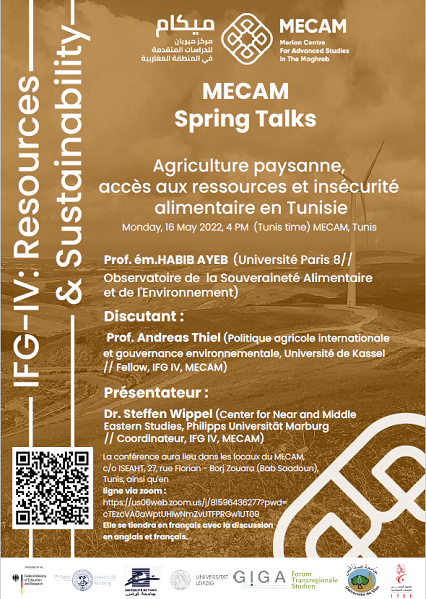
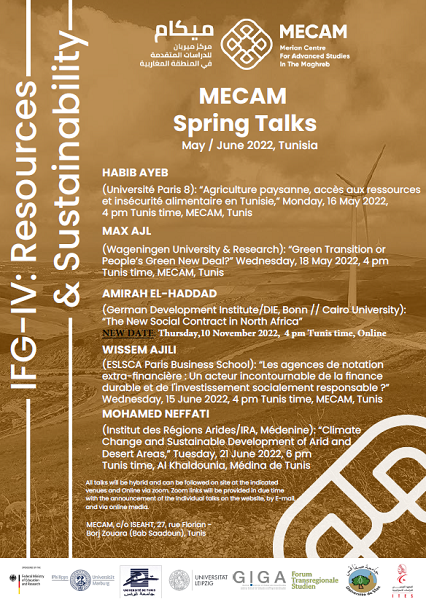
IFG IV “Resources & Sustainability”: MECAM Conference Series Spring Talks, May / June 2022,
From March to June 2022, the fourth Interdisciplinary Fellow Group “Resources and Sustainability” (IFG IV) at MECAM works on the origins and potential effects of a range of economic and social strategies that are currently being explored to create an alternative model of sustainable economic development in North Africa. The IFG investigates how such strategies might lead to positive socio-economic development and help address environmental challenges.
For the MECAM Spring Talks 2022, the IFG IV fellows have invited well-known colleagues as guest speakers to give a public talk on issues close to their own research from a wider perspective, which will be preceded by a non-public seminar for the fellow group. The lectures will be discussed by the fellows or other renowned experts. All talks will be hybrid.
—————————————————————————————–
Due to unforeseen circumstances, the lecture by Prof. Amirah El-Haddad, “The New Social Contract in North Africa”, announced for the Spring Talks series on Thursday, 2 June 2022, has to be cancelled and will be moved to 10 November 2022 (as a pure online presentation).
Memory and its mediatisation
What are the potentials and the challenges of mediatizing memory? What futures can mediatised memory promise? Through a reflection on collective memory and its limits, this panel is both an attempt to answer these questions from a theoretical and artistic perspective, and also an invitation to reflect on the role played by media in the ethics of documenting, forgetting and re-narrating the past. The Winter Talk takes place online via Zoom on Thursday, 03 February 2022, 18h30 – 20h00 (Tunisian and Central European time). Prof. Andrew Hoskins (University of Glasgow) and Mouna Karray participate in this panel as guest speakers and Dr Marianna Liosi (Weißensee Kunsthochschule Berlin / The Free Fine Arts Academy in Rimini) and Dr Rania Said (University of Massachusetts Boston) as discussants.
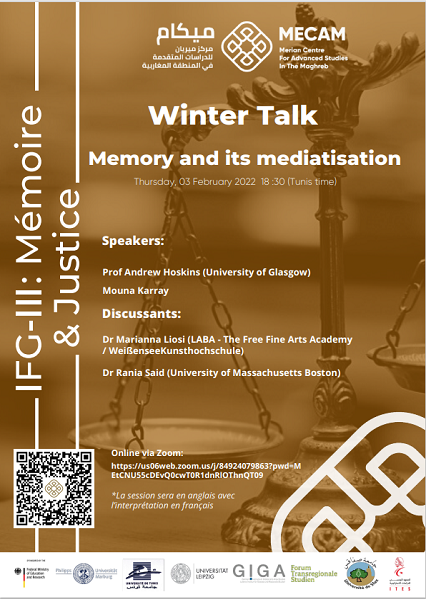
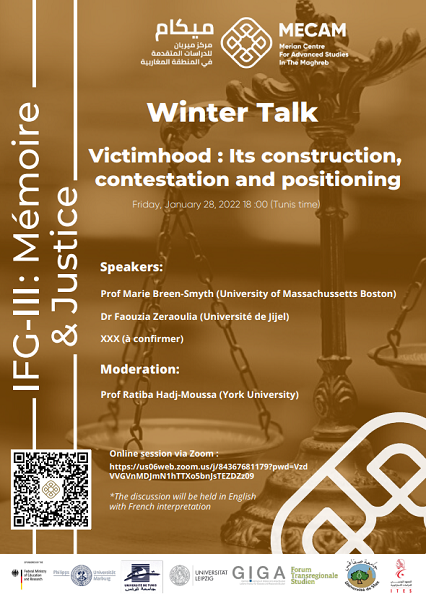
Victimhood: Its construction, contestation, and positioning
During transitional justice processes, one of the main objectives is to recognise the injustices suffered by people, who are considered as victims, to change the structures that allowed those injustices to take place. However, the notion of victim is not only legal, but also social and political. The lectures in this panel discuss meanings and uses of victimhood in the Irish and Algerian contexts.
The Winter Talk take place online via Zoom (Meeting ID: 843 6768 1179 and Passcode: 540480) on Friday, 28 January 2022, 18h30 – 20h00 (Tunisian and Central European time) with Prof Marie Breen Smyth (University of Massachusetts / University of Surrey) and Dr Faouzia Zeraoulia (University of Jijel) as guest speakers. Prof. Ratiba Hadj-Moussa (York University) will be the discussant.
Tunisia in transition
After the popular uprising that led, in 2011 in Tunisia to the fall of Ben Ali, Tunisia has been engaged, for ten years, on the path of a democratic transition process. The country has experienced, along the way, the proliferation of an unprecedented climate of freedom, including expression and press, which has not failed to enhance its image internationally as a “country of emerging democracy” and, especially in its regional environment, as “cradle” and as “unique model” and “successful example” of the Arab Spring. However, despite the democratic gains, shadows remain. Born in 2014, with the adoption of a compromise Constitution according to a mixed parliamentary system, Tunisian democracy is now going through a crisis that could jeopardize its existence. The political transition seems to be faltering, there is considerable mistrust of political parties, and the social crisis is permanent. How does this crisis manifest itself? What prospects can be envisaged to get out of it? In this Winter Talk, Mrs. Kmar Bendana, Mr. Mohamed-Salah El Omri and Mrs. Selima Kbaili propose to reflect on some aspects of this transitional process in Tunisia and the pitfalls inherent in its evolution.
This Winter talk takes place on Thursday, January 20, 2021, 6:30 – 8:00 pm and is moderated by Prof Sonia Zlitni-Fitouri (University of Tunis).
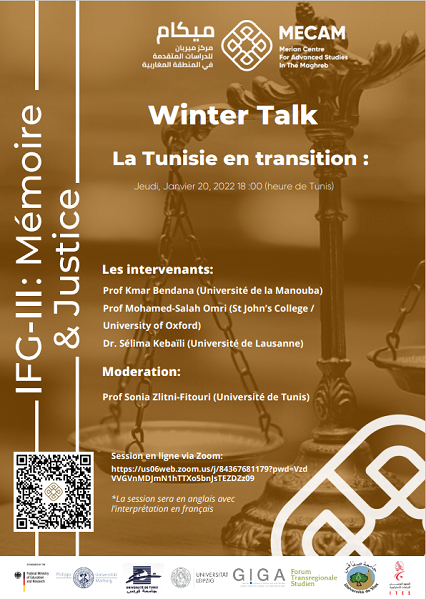
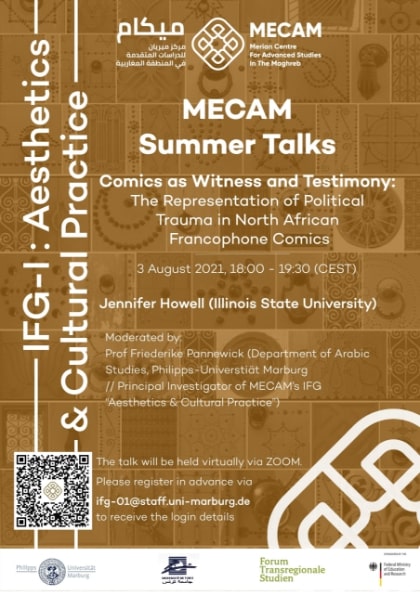
Jennifer Howell: The Representation of Political Trauma
Political trauma in French-language comics from North Africa. In the final presentation of the series, Jennifer Howell (University of Illinois) addresses the issue of memory and visual art, another central theme of the IFG, in the context of Algerian comics.
Kawthar Ayed : Science fiction and anticipation
The academic Kawthar Ayed, a specialist in Arab science fiction and anticipation literature in the Arab world, was the speaker at the second MECAM summer conference. Ms Ayed gave a fascinating presentation on literature as a means to imagine the future. As Ms Ayed showed, science fiction writers are often called upon as advisors by Western governments (for example, in the development of pandemic scenarios), whereas in the Arab world such links cannot be made, although there is a thriving tradition of science fiction writing in the region.
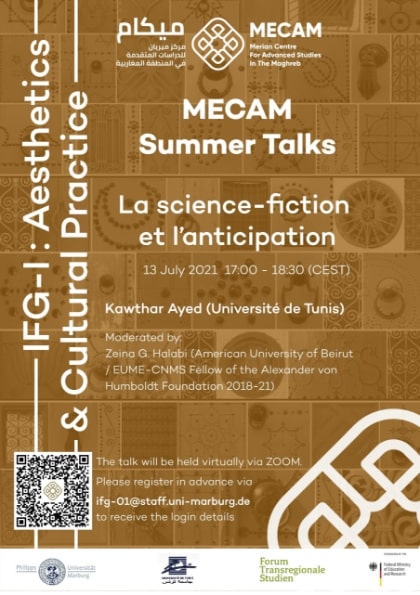
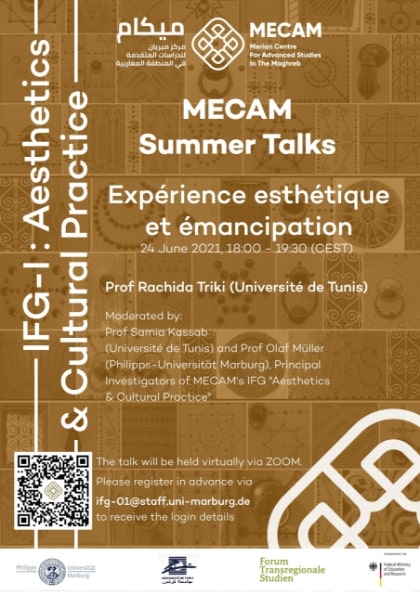
Rachida Triki : Aesthetic experience and emancipation
The MECAM Summer Talks were the first format created by the IFG. The guests, selected by the group of fellows, were chosen to probe deeper specific subjects. In addition to the public lectures, the speakers were invited to give a seminar in the framework of the fellow group. The Art Historian, curator and philosopher RachidaTriki from the Université de Tunis started off the series with her talk on “Aesthetic experience and emancipation”. Addressing a core question of the IFG’s research, the relationship between aesthetics and politics from the angle of visual arts, Trikiemphasized the emancipatory role of art.
